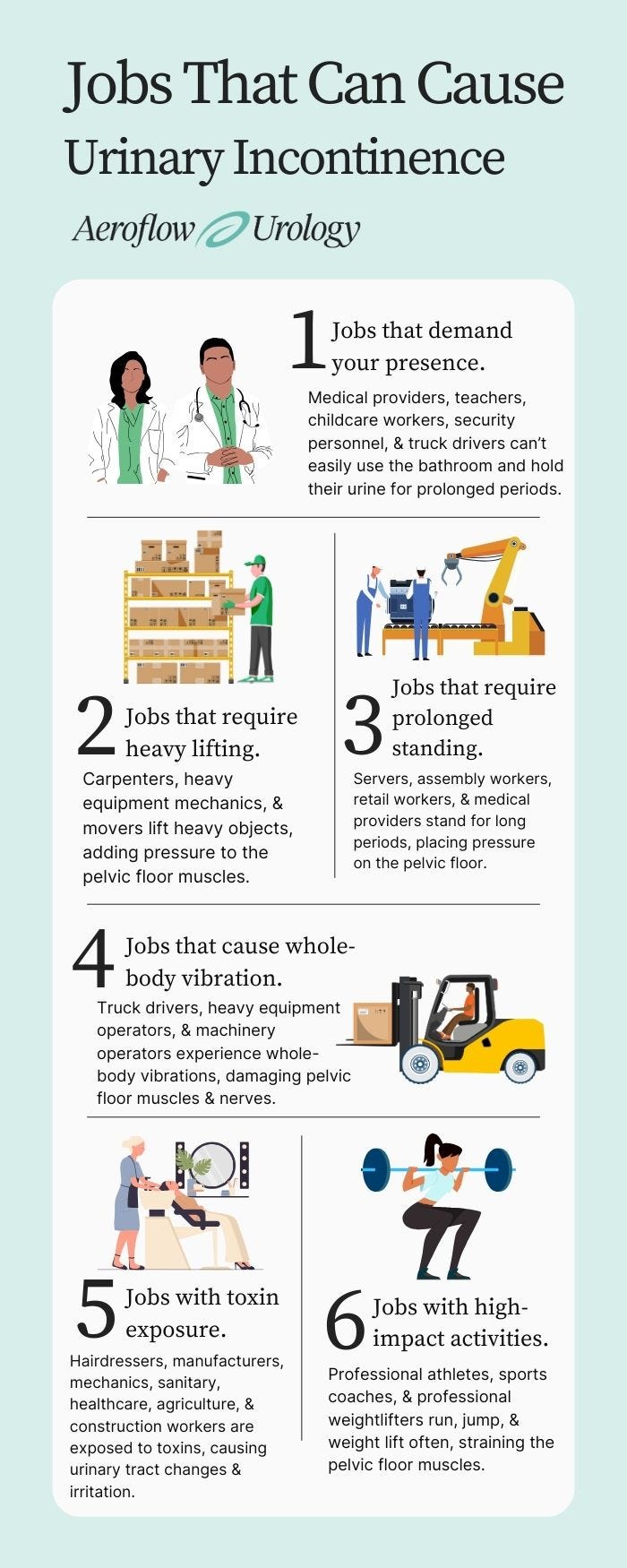Key Takeaways:
- Jobs in the healthcare, construction, security, childcare, and transportation industries can lead to loss of bladder control.
- Signs of urinary incontinence at high-risk jobs may include dehydration, frequent bathroom trips, or taking sick time due to urinary concerns.
- Having conversations around urinary health, using workplace modifications, and ensuring safety measures can help employees prioritize their urinary health.
Urinary incontinence can affect anyone, but if you’re in a field that demands physical labor, exposure to environmental toxins, or prolonged shifts, you may be more prone to developing the condition.
In this blog, we’ll explain how certain jobs can cause urinary incontinence and how employees and supervisors can be proactive and prioritize urinary health in the workplace.
Check Your Eligibility
In under 2 minutes!
Discover the bladder control supplies covered by your Medicaid plan.
Jump To:
Jobs That Can Lead to Urinary Incontinence
Is Job-Related Urinary Incontinence Treatable?
Lowering Your Risk of Developing Urinary Incontinence at Work
How to Get Insurance-Covered Bladder Control Supplies for Work
Prioritizing Urinary Health in the Workplace
INCONTINENCE PRODUCTS THROUGH INSURANCE:
Aeroflow Urology is in-network with many Medicaid and Medicaid-managed insurance plans and is accredited by Medicaid. Complete our Eligibility Form, and we’ll automatically check to see if your plan covers incontinence supplies. ***Must meet certain requirements to qualify.***
You will also receive the care and attention every person managing incontinence deserves: A personalized list of 100% insurance-covered incontinence supplies, a dedicated Continence Care Specialist you can contact during business hours, a user-friendly online portal for easy monthly reordering, and educational content.
Get the continence care you need with the dignity you deserve. It only takes 2 minutes to get started.
What Is Urinary Incontinence?
Urinary incontinence (UI) is a loss of bladder control that often results in urinary leakage. Other symptoms can accompany UI, including:
- Feeling the urge to pee more often than usual or using the bathroom more often than usual.
- Feeling the sudden and intense urge to urinate, leading to leakage (urge incontinence).
- Leaking urine when coughing, sneezing, bending over, or lifting heavy objects (stress incontinence).
UI is diagnosed by a healthcare provider or specialist, such as a urologist or pelvic floor therapist. If you have symptoms of UI, see a provider to be diagnosed appropriately to take the proper steps to manage your leakage.
Jobs That Can Lead to Urinary Incontinence
Some jobs may lead to the development of UI for a multitude of reasons. Increased abdominal pressure on your pelvic floor, fatigue of the pelvic floor muscles after repetitive injury / trauma, exposure to toxins / chemicals, and prolonged time between emptying your bladder can all lead to UI.
Jobs That Demand Your Presence
Jobs that demand your presence or that don’t allow for easy access to a bathroom can commonly lead to UI due to holding urine for too long, leading to leakage and other issues. Jobs like these include:
- Medical providers, surgeons, nurses, or first responders.
- Teachers
- Childcare workers.
- Security personnel.
- Truck drivers.
Jobs That Require Heavy Lifting
If you work in a field that requires heavy lifting, you may have more frequent bathroom breaks and may not need to hold your urine for prolonged periods, but you do need to lift heavy objects (100 lbs or more) regularly.
Lifting these objects places extra pressure on the abdomen area, which adds pressure to the pelvis and pelvic organs, which can lead to UI. These types of jobs include:
- Carpenters
- Heavy equipment mechanics.
- Movers
Jobs That Require Prolonged Standing
Similar to heavy lifting careers, if you’re in a job that requires standing for long periods, your abdominal pressure is increased, adding extra pressure to the pelvis and pelvic organs, leading to UI. Jobs include:
- Servers or other restaurant staff.
- Assembly line workers.
- Retail workers.
- Medical providers (surgeons, nurses, etc.).
Jobs That Cause Whole-Body Vibration
If you are exposed to whole-body vibration at your job, you may develop UI. These vibrations cause potential damage to the pelvic floor muscles and nerves. Jobs include:
- Truck drivers.
- Heavy equipment operators.
- Machinery operators.
Jobs With Toxin Exposure
Jobs that require you to be exposed to toxins may cause UI. Chemicals, irritants, and toxins can cause lower urinary tract changes and irritation, which can cause you to develop UI. These types of jobs include:
- Hairdressers
- Janitorial / sanitary workers.
- Healthcare workers.
- Manufacturers.
- Agriculture workers.
- Construction workers.
- Mechanics / automotive workers.


Jobs With High-Impact Activities
Certain high-impact or high-intensity activities, such as running, jumping, or heavy weightlifting, can strain your pelvic floor muscles and exacerbate UI symptoms, especially if you have underlying pelvic floor weakness or dysfunction. Jobs include:
- Professional athletes.
- Sports coaches.
- Professional weightlifters.
Signs of Urinary Incontinence
It may be difficult for supervisors at high-risk jobs to spot developing or existing UI because most of the time, people feel too ashamed to disclose when they’re having urinary concerns.
Implementing policies and procedures ahead of time is essential for preventative-focused urinary health and management.
While it may be challenging to identify, some symptoms of UI in employees may include dehydration, increased thirst, needing to change clothes, rushing to the restroom, and employees taking sick time for UI symptoms / urinary tract infections (UTIs).
Is Job-Related Urinary Incontinence Treatable?
Absolutely! If caught early, UI can be easily reversed with biofeedback and bladder training treatments. However, if UI is not recognized until later, these simple treatments may not be as reversible, and modifications may need to be made.
Management and workplace teams should be contacted immediately if an employee is willing to share that they’ve been diagnosed with UI to prevent other employees from facing the same condition.
If you already have UI, you may qualify to receive free bladder control supplies, like male or female bladder control pads, adult pull-ons, and more through your insurance plan. Fill out Aeroflow Urology's simple form to get started!
Lowering Your Risk of Developing Urinary Incontinence at Work
Use these tips to lower your risk of developing UI at a high-risk job.
- Stay hydrated and take restroom breaks as often as you can when needed.
- Communicate with your coworkers to plan bathroom breaks to optimize bladder function and overall urinary health.
- Speak with your supervisors about using ergonomic workstations (elevated desks, walking / treadmill pads, proper lifting equipment, etc.).
- Ensure proper safety measures are taken to decrease your chances of straining your pelvic floor muscles.


This may require speaking with your supervisors about the following:
- Policies on heavy lifting restrictions.
- Regular breaks and rest periods.
- Time management for breaks.
- Access to water.
- Toxin exposure limitations or proper safety equipment.
Prioritizing Urinary Health in the Workplace
Because we live in a capitalist society where resources are scarce and modifications cost money, one misconception is that management doesn’t care whether their employees develop UI. Since money continues to be the center of our universe, it will likely take many employees at high-risk jobs to be brave enough to engage in conversations about prioritizing their urinary health before any significant changes occur in the workplace.
Disclaimer
Information provided on the Aeroflow Urology blog is not intended as a substitute for medical advice or care from a healthcare professional. Aeroflow recommends consulting your healthcare provider if you are experiencing medical issues relating to incontinence.














